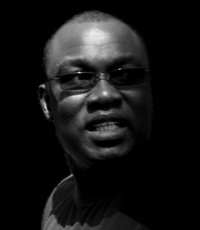by Kelechi Njoku
Nnanna’s grandfather had died, fifteen years before he was born, of some illness that left him wasted to the bone. At that time there was no photograph of the man, and the family needed a picture to go on the obituary announcement and funeral programme. So the morning after the night he died, they packed his corpse into an armchair, squeezed a cushion between his neck and the chair’s headrest to prevent it from lolling, and signalled to the photographer to click away – never mind the man’s shut eyes.
Nnanna had seen that photo many times. The person in it was unrecognisable as a human being. He might have been an elaborate frame wrapped in thin skin. That was the man his father described as Nnanna’s look-alike: the ears, large and curved at the top, and the forehead, not quite rounded, almost a flat bone.
“My father,” Nnanna’s father often said to him, “rarely smiled. It was almost a shock when he did. Just like you.”
Nnanna had tried, but failed, to understand what could be shocking about a smile, however rare. His name – Nnanna – meant father’s father. He was his grandfather return to life, according to old beliefs. But, his parents did not follow the old beliefs. They were Catholic. His father was a member of the Laity Council, and his mother led the noontime angelus from her fish stall in the market.
“People do not die and come back to this world in new bodies,” she stated once, framing seven-year-old Nnanna’s head in her palms to steady his gaze on her own face. His name was simply to honour his grandfather’s memory, no more.
Nnanna nodded. It made sense.
Yet, one Monday morning, Nnanna – now eighteen years old – was overcome by a wish to reincarnate.
He had no idea how this would work. If, after he died, his spirit would float about, perhaps in a black colloidal suspension – for God knows how long – until he found a womb to enter and be born again.
His mother lay on the long settee in the sitting room, a half-filled glass of water and a card of paracetamol on a stool beside her. A damp towel rested on her forehead, and her lips – normally full – had transformed into thin slices as she pressed them together. Her eyes were red, like she had appolo.
Nnanna rolled his gaze away from her, to the floor. He was sorry. Sorry that he had told her yesterday that he did not understand God, and that he wanted to stop attending church. Sorry she had cried all through yesterday, and taken off her Sunday clothes – Nnanna’s father could go to church without her, tell anyone who asked that she was not feeling well.
Nnanna was sorry he had woken up this morning to catch her shivering as she knelt to pray in the sitting room. He knelt beside her, and felt heat breathing off her skin.
“It’s the rubbish he reads!” Nnanna’s brother Julu had said when their father called him to ask him to “talk” to his brother. Julu was older than Nnanna by three siblings between them. He lived with his wife and a child in Calabar, a six-hour bus ride away. But when he had called to scold, Nnanna had flinched from the phone, forgetting his quick-tempered brother was not close enough to punish him physically. His breathing had quickened: No, no, he did not plan to kill their mother. Why was Julu talking like this? He had not stolen, he had not gotten a girl pregnant.
Julu flew home from Calabar that Monday evening. An hour’s journey.
“You know Mum’s condition,” he said as he dropped his travel bag, “and this is what you bring back home barely a semester into university?” He referred to their mother’s blood pressure, constantly high.
He drove their mother to hospital in their father’s car.
Nnanna went into his room, and thought of the hospital and the taut faces of the patients that would be there with their many complaints: an ache that had kept sleep out of reach, a cough that had burned their throat raw, a pregnancy unplanned for, a black eye, a mammography appointment, kidney failure. These were all simple problems, Nnanna ruled. None of them slipped past understanding – like the existence of the afterlife, for instance. Nnanna was not sure about that place born of man’s unwillingness to engage with the innate pointlessness of the here; and he wondered if his doubt would sabotage his wish to return and have a second shot at life.
It would be different then, he promised the wall of his room (from which hung a wooden crucifix). It would be simpler. He would not read rubbish from Kant and Dawkins and the essays of thinkers on the internet – what did they know, the unfeeling, cynical bastards! He would be content with everything just as he’d met them and defend these things for the sake of consistency and familiarity; he would do as he was told, and leave be what he didn’t understand. He would not, as an eight-year-old child, walk up to his father and ask why it seemed all the angels in heaven were male, no females; and a Thursday evening would never come when Julu would lunge at him – “Fool, fool!” – raining conks on his head, because their mother had died that afternoon, with his name on her last breath. ■
_______________
Kelechi Njoku is a journalist and edits a growing enviroment-themed magazine “The Clip”. He has had his fiction published and forthcoming in the Kalahari Review and Naija Stories Anthology. He lives in Abuja.

